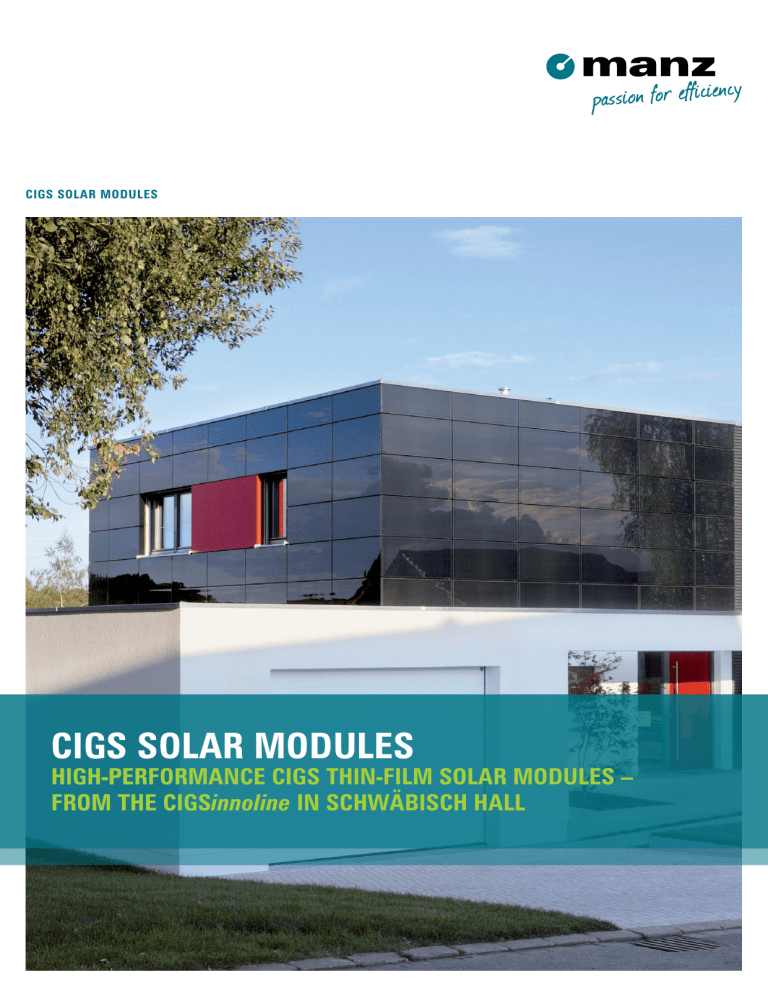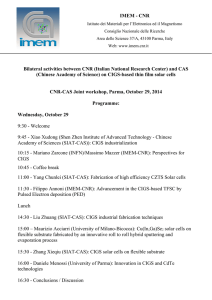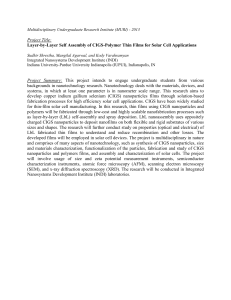CIGS Solar Panels PDF
advertisement

CIGS SOLAR MODULES CIGS SOLAR MODULES high-performance CIGS thin-film solar MODULES – from the CIGSinnoline in Schwäbisch Hall cigs thin-film solar MODULES contentS CIGS Power MODULES 3 Manz CIGS Solar MODULES 4 M - GES101E092 / M - GES105E092 6 M -GCS107E090/ M-GCS123E090 7 3 CIGS POWER MODULES CIGS thin-film technology is based on a razor-thin conductive layer of copper, indium, gallium, and selenium. According to experts, it is the solar technology that currently has the greatest potential and offers compelling advantages over both other thin-film technologies and crystalline silicon solar cells. Sustainable Production One benefit is already exhibited during production – namely the low amount of material required. While present-day crystalline cells are around 200 µm thick, the CIGS absorber is less than 2 µm thick. This saves material during production and is sustainable and environmentally friendly. Maximum efficiency CIGS modules offer superior efficiency compared to other thin-film technologies. Highperformance modules based on CIGS technology can already match the efficiency of multicrystalline solar modules. An architectonic highlight – the facade integration CIGS modules are very well suited for integration in building facades, thus for vertical installation. They impress with their modern and aesthetical design. Excellent temperature coefficient The low temperature coefficient of CIGS modules compared to crystalline solar modules provides for an excellent energy yield at higher module temperatures. Quality Made in Germany Manz’s aesthetically sophisticated CIGS solar modules are manufactured on the Manz CIGSinnoline at our facility in Schwäbisch Hall, using the latest high-tech systems in adherence with strict quality standards. 4 MANZ CIGS SOLAR MODULES MANZ CIGS Solar MODULES – Energy Efficiency and Sustainable Power Generation With the Highest Degree of Efficiency 35 years of experience in CIGS technology Highest degree of efficiency and certified quality Together with our partners, Manz can draw from 35 years of experience when it comes to CIGS technology. One milestone in the technology’s development was the first pilot line for CIGS modules built by the Center for Solar Energy and Hydrogen Research Baden-Württemberg (ZSW) in 1995. Five years later, the first pilot line for modules measuring 1,200 × 600 mm came into operation – a predecessor of the later CIGS production line from Würth Solar, which was used to produce a solar module with an aperture efficiency of 15.9 % in the summer of 2012, breaking all previous world records. In early 2012, the production line was acquired by Manz together with 118 employees and the rights to the CIGS technology, and was converted into an innovation line. And since then, Manz has produced high-performance CIGS solar modules on its CIGSinnoline. Guaranteed Quality The conversion of the production line into an innovation line with an output of 6 MWp /a and the use of newly developed high-tech systems from Manz guarantee solar modules with the highest degree of efficiency that are inspected and tested with a particular focus on quality. Efficient Production Processes for Affordable Module Prices Thanks to efficient production processes, cost-cutting potentials that have a direct impact on the price of Manz’s CIGS solar modules can already be tapped during production. 5 Use of CIGS solar modules in open areas Benefits of Facade Integration The integration of CIGS solar modules into building facades offers benefits when constructing new buildings or reconstructing existing buildings. The solar modules replace the conventional facade and in addition to generating electricity they also protect the facade from weathering. Manz has unparalleled expertise in the integration of CIGS solar modules into building facades. For construction and production processes of building-integrated solar modules we follow the technical regulations for buildings. Sustainability The term “Energy Payback Time” describes the amount of time a system needs to produce the amount of energy that was required to produce the system in the first place. Measuring approximately one year, Manz CIGS modules have a significantly shorter energy payback time than crystalline silicon solar modules. In addition, the efficient production process on the CIGSinnoline and the minimal use of materials saves resources over the long term. Building-integrated CIGS solar modules Multifunctional solar modules Unparalleled expertise in facade integration A sustainable manufacturing process for people and the environment For a clean environment tomorrow – CIGS solar modules from Manz. More information on system solutions for building-integrated photovoltaics (BIPV) 6 A module with frameless ES design Use of CIGS solar modules in open areas M-ges101E092/M-GES105E092 Standard module with two junction boxes Cell Type CIGS Application Open areas/Roof installations without shading Electrical CHARACTERISTICS at Standard Test Conditions (STC): E = 1000 W/m², AM 1.5, Tm = 25 °C Frameless model Certified by TÜV Rheinland according to IEC 61646 and IEC 61730 * Maximum power [Pmax] Voltage at MPP [Vmpp] 74.0 V Current at MPP [Impp] 1.25 A Open circuit voltage [Voc] 93.1 V Short circuit current [Isc] 1.37 A Open circuit voltage at –10 °C 600 ±2 A - ID:040563287 B + Operating temperature of cells at irradiance of E=800 W/m², Tu=20 °C, wind speed Vw=1 m/s FA-001143 01-120328-00001-001 Manz CIGS Technology GmbH Alfred-Leikam-Str. 25 D-74523 Schwäbisch Hall www.manz.com CIGS Photovoltaik-Modul M-GES105EXXX Pmax: xx W VMPP ISC xx A VOC Max. System Voltage: xx V xx V xxx VDC Production tolerance: Behold quality certificate Dimensions: 1200x600x19 mm (± 2 mm) All Power Specifications at STC - L=180 102.6 V NOCT (Nominal Operating Cell Temperature) M-GES105 SHA1 92.5 W NOCT 47±3 °C High Performance Products Made in Germany System Data L=280 1200 ±2 Maximum system voltage 1000 V Reverse current load [IR] Power Output Tolerance (Pmax) [Pmax] Maximum allowable operating temperature Max. 2 × Isc –0 / +2.5 W – 40 …+85 °C Maximum surface pressure 2,400 N/m² Temperature Coefficients Temperature coefficient of open circuit voltage – 0.29 % / °C Temperature coefficient of module output – 0.36 % / °C Temperature coefficient of short circuit current Dimensions/Weight 600 ±2 19 B A Back side M-GES105 Date: 23.09.2014 Version: V2 Length 782365040:DI Article: 0.05 % / °C Reproduction and dissemination of this drawing as well as utilization and communication of its contents is permitted unless expressly authorized. Noncompliance will result in seeking damages to cover. All rights, including rights created by patent grant or registration of a utility model or design, are reserved. - 081=L - 082=L + 1,200 mm Width 600 mm Height 19 mm Laminate thickness 7.75 mm Front glass thickness 4 mm 1200 ±2 Weight MODULE Layout 7.75 4+3mm Float EVB sheet Front cover Clear glass Framing without Connectors LC4 Junction box Lumberg Bypass diode without * applies to M-GES105E092 Frameless With cross scribe Front side Article: M-GES105 Date: 23.09.2014 Version: V2 Reproduction and dissemination of this drawing as well as utilization and communication of its contents is permitted unless expressly authorized. Noncompliance will result in seeking damages to cover. All rights, including rights created by patent grant or registration of a utility model or design, are reserved. 13.14 kg 7 Use of CIGS solar modules on buildings M-GCS107E 090/M-GCS123E090 Cell Type CIGS Application Facades/Roof installations Standard module with central junction box Electrical Data at Standard Test Conditions (STC): E = 1000 W/m², AM 1.5, Tm = 25 °C Maximum Power [Pmax] Voltage at MPP [Vmpp] 72.9 V Current at MPP [Impp] 1.23 A Open circuit voltage [Voc] 91.9 V Short circuit current [Isc] Frameless model 90.0 W Certified by TÜV Rheinland according to IEC 61646 and IEC 61730* 1.36 A Open circuit voltage at –10 °C 101.2 V ±2 74.5 - NOCT + Operating temperature of cells at irradiance of E=800 W/m², Tu=20 °C, wind speed Vw=1 m/s ID:040563287 600 ± 2 NOCT (Nominal Operating Cell Temperature) M-GCS123 FA-001143 01-120328-00001-001 SHA1 47±3 °C Manz CIGS Technology GmbH Alfred-Leikam-Str. 25 D-74523 Schwäbisch Hall www.manz.com CIGS Photovoltaik-Modul M-GCS123 Pmax: xx W VMPP ISC xx A VOC Max. System Voltage: xx V xx V xxx VDC Production tolerance: Behold quality certificate Dimensions: XXXX x XXX x XX mm (± 2 mm) All Power Specifications at STC High Performance Products Made in Germany System Data Maximum system voltage 1000 V [IR] Power Output Tolerance (Pmax) [Pmax] Maximum allowable operating temperature L=800 Max. 2× Isc – 5 / +5 W 1200 ± 2 Reverse current load L=950 – 40 …+85 °C Maximum surface pressure 2,400 N/m² +- Temperature Coefficients Temperature coefficient of open circuit voltage – 0.29 % / °C Temperature coefficient of module output – 0.36 % / °C Temperature coefficient of short circuit current - 0.05 % / °C Dimensions/Weight Rückansicht 600 ± 2 Informationen 1,200 mm Width 600 mm M-GCS123 Menge: Datum: 18.09.2014 Datum: Version: V2 Unterschrift: 27 Weitergabe sowie Vervielfältigung dieser Zeichnung, Verwertung und Mitteilung ihres Inhalts ist nicht gestattet, soweit nicht ausdrücklich zuge standen. Zuwiderhandlungen verpflichten zu Schadenersatz. Alle Rechte für den Fall der Patenterteilung oder Gebrauchsmustereintragung vorbehalten. Technische Änderungen vorbehalten! Farbtiefe als auch Farbton des CIGS-Halbleiters können Farbunterschiede aufweisen. Siebdruckfarbe ähnlich RAL. 27 mm Laminate thickness 7.75 mm Front glass thickness L=800 4 mm Weight -+ 13.14 kg L=950 CD V0001 MODULE Layout 1200 ± 2 Height Freigabe zur Produktion Artikel: 782365040:DI Length - Front cover Clear glass Framing without Connectors MC 4 Junction box Hirschmann Bypass diode BY255 +- - 7.75 4+3mm Float EVB sheet 266.3 ± 2 Frontansicht 27 * applies to M-GCS123E090 265.5 ± 2 08 / 2015 MANZ AG Manz AG Steigaeckerstrasse 5 72768 Reutlingen Germany Phone +49 7121 9000 0 Fax +49 7121 9000 99 www.manz.com info@manz.com Manz CIGS Technology GmbH Alfred-Leikam-Strasse 25 74523 Schwaebisch Hall Germany Phone +49 791 95665 0 Fax +49 791 95665 111 www.manz.com info@manz.com

